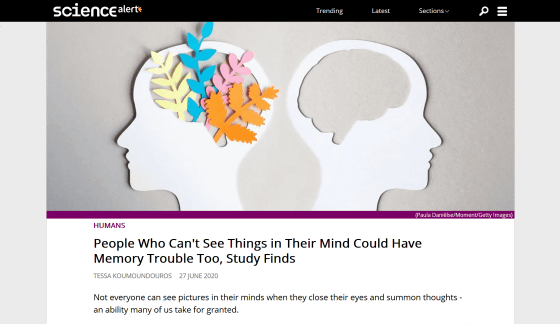'The type of person who can not imagine the image in the brain' may have problems with memory etc.

Many people can imagine the scenery or imaginary sight they saw somewhere in their brain, but there are also people called “
A cognitive profile of multi-sensory imagery, memory and dreaming in aphantasia | Scientific Reports
https://www.nature.com/articles/s41598-020-65705-7
People Who Can't See Things in Their Mind Could Have Memory Trouble Too, Study Finds
https://www.sciencealert.com/some-people-can-t-picture-things-in-their-mind-and-it-might-make-it-hard-for-them-to-remember

The existence of people who can't visualize images in their heads has long been known, and British scholar
In 2005, Professor Adam Zeeman of the University of Exeter met with 'a person who lost the visualization ability in the brain as a side effect of surgery', and research began, and in 2015 this condition was called 'Aphantasia'. The name was given. It seems that there are more people than I can imagine the image in the brain, and it is said that 1 in 50 people is afantasia.
What is 'Aphantasia' that you can't imagine the person or landscape in your head? -GIGAZINE

by Alice Popkorn
Alexei Dawes , a cognitive neuroscientist at the University of New South Wales , conducted a survey of 667 subjects on items such as visual ability, memory, dreams, and trauma. The subjects also included 267 afantasias collected online from 31 countries, of which 83% were English native and 88% were white.
The survey revealed that people in Aphantasia had less ability to remember past events and imagine the future, and had less chance to dream when sleeping. 'Our findings suggest that visual images may play an important role in the process of memory,' Dawes said. 'This suggests that all cognitive functions involving sensory visual components are likely to be diminished in people of the aphantasia,' said co-author co-author cognitive neurologist Joel Pearson. I commented.

In addition, not only the senses related to visualization such as memory, but also many senses such as hearing, touch, kinesthesia, taste, smell, and emotions were reduced in the afantasia people. It is reported that the ability to reproduce in-house is low. Alan Kendle, a fantasia, testifies that he is 'unable to play music in the brain' unlike other people.
“I didn't understand that at first (many people can play music in the brain). To me, the ability to play music in my mind is extraordinary, almost like a magic trick on TV. It was,” said Kendle. While there are people like Mr. Kendle, it is not that other Afantasia people can not reproduce the sense in the brain, and that individual differences among Afantasia were seen.
Since the current study relies mostly on self-reporting, the team acknowledges that the results may also be subject to subject bias. However, the answer about the spatial cognitive ability that seems to be related to visualization seems to have made a big difference among the people of Aphantasia, and the research result depends so much on the idea that 'I am an Aphantasia'. It seems that it was suggested that it may not have been done. 'We're learning how radically different the inner worlds of imageless people are,' said Dawes.

Related Posts:
in Science, Posted by log1h_ik







